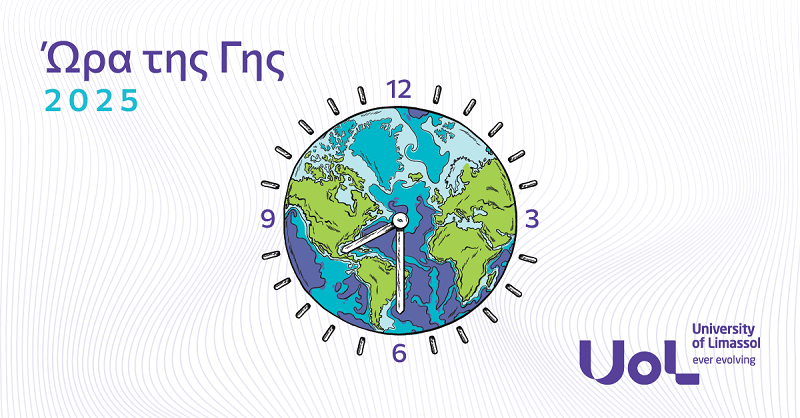On March 22, 2025, the University of Limassol (UoL) turned off the lights from 8.30-9.30pm, participating in the campaign to raise awareness for the protection of nature and the fight against climate change.
Climate change is considered the biggest environmental, economic and social crisis in the history of mankind, a fact that the University of Limassol (UoL) takes seriously and actively supports climate actions with its broader actions.
The impacts of climate change are already being felt around the world and are predicted to become more frequent and intense in the coming decades.
Without action to tackle climate change based on EU data, the Continent could experience the following in the lifetime of our children:
- 400 000 premature deaths per year due to air pollution
- 90 000 deaths per year due to heatwaves
- 40 per cent less water available in the southern regions of the EU
- 2.2 million people at risk of coastal flooding every year
- €190 billion in annual economic losses (https://climate-pact.europa.eu/about/climate-change_en)
These changes in climate have the power to transform our planet, affecting our food and water supplies as well as our health. Although the risks are for everyone, these impacts are hitting vulnerable groups of the population the hardest.
The Cyprus Earth Hour team continues this year its for zero food waste campaign, setting for the third year, as a national goal, the creation of a policy on the issue, while giving all locals a chance, with simple actions of their own, to connect with the earth and become part of a positive change for the planet.
This serious problem is manifesting itself in a particularly threatening way in the wider Middle East and Eastern Mediterranean region, where phenomena are expected to intensify, according to strong predictions from climate models, which, according to scientists, show extreme climatic stresses for the region, home to over 350 million people. The signs of the effects of climate change are already visible: extreme weather events (fires, floods, heat waves), rising average temperatures and decreasing rainfall.
Decisions to tackle the problem are not only national policies, but also personal ones, expressed through a change in habits, green production and consumption and green business, based on sustainable development, the circular economy and the bioeconomy.
This year in Earth Hour, the University of Limassol (UoL) connected with nature for one hour. This hour, when millions of citizens around the world turn off the lights, also marks the longest for our planet!
Ultimately, Earth Hour is a message of hope and action because the continuation of life on the planet needs global-scale synergies with local actions.






Click here to change your cookie preferences